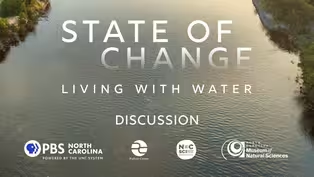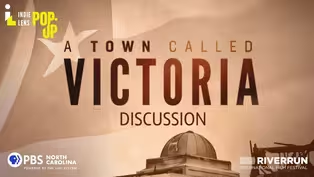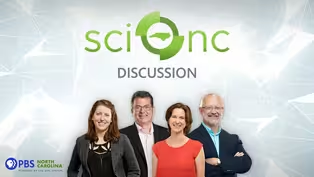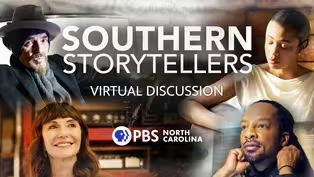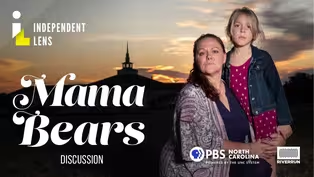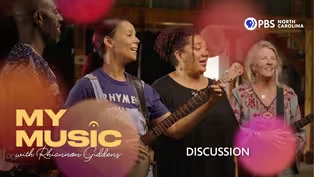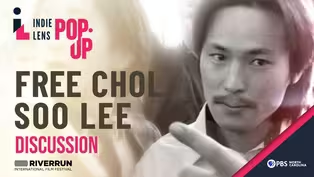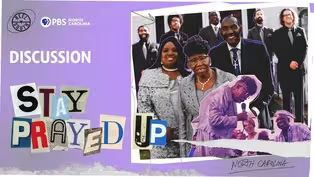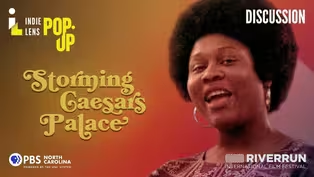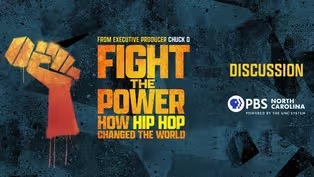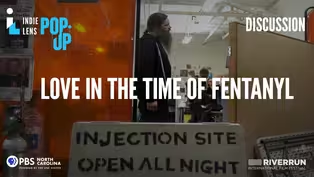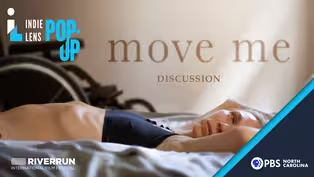PBS North Carolina Specials
Discussion - Native America Season 2
10/19/2023 | 39m 1sVideo has Closed Captions
Panelists discuss preserving the languages of Native American tribes.
Angelina Jumper (EBCI), cultural resources supervisor for the Eastern Band of Cherokee Indians, leads a conversation about discovering and preserving language of Indigenous Peoples. Our panelists: Daniel Golding (Quechan), Native America Season 2 producer and director, and Beau Carroll (EBCI), lead archaeologist for the Eastern Band of Cherokee Indians Tribal Historic Preservation Office.
Problems playing video? | Closed Captioning Feedback
Problems playing video? | Closed Captioning Feedback
PBS North Carolina Specials is a local public television program presented by PBS NC
PBS North Carolina Specials
Discussion - Native America Season 2
10/19/2023 | 39m 1sVideo has Closed Captions
Angelina Jumper (EBCI), cultural resources supervisor for the Eastern Band of Cherokee Indians, leads a conversation about discovering and preserving language of Indigenous Peoples. Our panelists: Daniel Golding (Quechan), Native America Season 2 producer and director, and Beau Carroll (EBCI), lead archaeologist for the Eastern Band of Cherokee Indians Tribal Historic Preservation Office.
Problems playing video? | Closed Captioning Feedback
How to Watch PBS North Carolina Specials
PBS North Carolina Specials is available to stream on pbs.org and the free PBS App, available on iPhone, Apple TV, Android TV, Android smartphones, Amazon Fire TV, Amazon Fire Tablet, Roku, Samsung Smart TV, and Vizio.
Providing Support for PBS.org
Learn Moreabout PBS online sponsorshipMore from This Collection
Recordings of previous virtual event discussions.
Discussion - State of Change: Living with Water
Video has Closed Captions
Panelists discuss resilient North Carolinians adapting to climate change. (28m 54s)
Discussion - A Town Called Victoria - Independent Lens
Video has Closed Captions
The filmmaker and former Victoria residents share their story. (46m 51s)
Video has Closed Captions
Sci NC executive producer and host, Frank Graff, chats about upcoming Season 6 of Sci NC. (26m 6s)
Discussion - Southern Storytellers
Video has Closed Captions
Author David Joy and others discuss storytelling and their new PBS series. (42m 13s)
Discussion - Mama Bears | Independent Lens
Video has Closed Captions
Producer and director Daresha Kyi discusses the film and LGBTQIA+ advocacy. (34m 41s)
Discussion - My Music with Rhiannon Giddens
Video has Closed Captions
Discussing the series with producers Will & Deni McIntyre and country artist Rissi Palmer. (39m 56s)
Discussion - Free Chol Soo Lee | Independent Lens
Video has Closed Captions
Local lawyers, professors and nonprofit leaders discuss wrongful convictions and reentry. (40m 44s)
Discussion - Stay Prayed Up, Reel South
Video has Closed Captions
The filmmakers discuss their journey with Mother Perry and The Branchettes. (45m 4s)
Discussion - Storming Caesars Palace | Independent Lens
Video has Closed Captions
Local professors and nonprofit leaders discuss welfare and the social safety net. (33m 2s)
Discussion - Fight the Power: How Hip Hop Changed the World
Video has Closed Captions
Local experts discuss the history of hip hop with PBS North Carolina. (59m 43s)
Discussion - Love in the Time of Fentanyl | Independent Lens
Video has Closed Captions
Local harm reductionists, therapists and others discuss the opioid crisis and more. (55m 44s)
Discussion | Independent Lens: Move Me
Video has Closed Captions
A dancer with blindness and disability advocates discuss adaptable arts programs. (38m 46s)
Providing Support for PBS.org
Learn Moreabout PBS online sponsorship- Good evening.
I'm Angelina Jumper.
I'm the Cultural Resources Supervisor for the Eastern Band of Cherokee Indians.
My family is from the Snowbird community where I currently reside.
My work is focused on preserving Cherokee culture and history in Graham and Cherokee Counties.
I'm also over a small tribal museum that we are currently in the process of rebuilding called the Junaluska Museum.
It will be located in Robbinsville, North Carolina, where we hope to share the story of Junaluska and our story of the resistance to the removal.
I am honored PBS North Carolina asked me to host this important discussion tonight.
And thrilled so many of you logged on to join us.
Tonight we are coming together to discuss a beautiful and important series "Native America."
We want to provide a safe space for an open and informative community-driven discussion.
Please be respectful when entering your questions and comments for this evening's panelists in the chat feature to the right of your screen.
Joining us this evening are two very special guests, Daniel Golding, series producer and director, and Beau Carroll, lead archeologist for the Eastern Band of Cherokee.
So Daniel, thanks for being here with us this evening and sharing such an important film with us.
Why was this series so important to you and why do you think it made such a difference for you to be the one to produce and direct the series?
- Well, good evening.
I guess it's evening over there where you're at.
I'm based in Arizona.
But you know, I think it's important.
That's kind of a long question to answer, but you know, I think there's a lot of reasons.
I think this series paints a contemporary portrayal of us as Native people today.
But it also intersects and interweaves sort of the historical part, which is important, the historical part of what led to us being here today.
So the series is really four parts.
The first one episode is "New World," and then the second one is "Warrior Spirit," and then "Women Rule."
And then the episode you just saw now, we'll be airing fourth one, "Language is Life," but I think it's important not only for other people out there in the world to learn more about us as Native people and our diversity and our rich culture and the challenges we face today and have overcome, but also for us as Native people to interact and learn from each other, you know?
And so this was a great experience for me as a producer to learn about tribes in Maine, which I had no idea there was a tribe up in Maine.
Being from Arizona, there's tribal people everywhere, but, or North Carolina, you know, meeting people in North Carolina and all over has been great and to understand our sort of shared common issues and experiences and to let each other know that we understand, you know, we've been through this as well.
But I'm excited to be here and thank you all, and yeah.
- Awesome.
Thank you so much, Daniel.
And so Beau, thank you so much for joining us this evening.
You're an archeologist and you have dedicated your career to uncovering and preserving the ancient language of the Eastern Band.
Why is it so important to you to preserve the language and share what you've learned uncovering pictographs?
- Thank you for allowing me to be here.
I want to thank PBS for having me and sharing this important story.
I wanna thank Daniel for making an awesome film.
The Cherokee language is close to being extinct.
We're having a tough time revitalizing the language and like it was said in the video, language is who we are.
It's a vital part of our culture.
And for that to be gone is just another step toward us not being Cherokee people anymore.
The petroglyphs, they, for me personally, they take me back hundreds of years and they provide a connection to my ancestors that I normally wouldn't have of the petroglyphs being in the caves or the pictographs being in the caves show this continuation of existence.
It ties us to this land.
It takes us from prehistoric to historic.
There's not a divide within that.
And I think that's why it's important.
- Definitely.
Definitely.
Especially with what we have about 150 speakers left with the Eastern Band today, for sure.
So Daniel, in the film, we see with the Library of Congress with wax wools that preserved language and songs from many generations ago.
What did it mean to you to have the opportunity to bring this resource back to communities today?
- Well, the wax cylinders, that was a really interesting story, and it was really a great thing because that's something that's personal to myself as well.
So that's why I really was interested in telling that story of the wax cylinders.
I was familiar with the wax cylinder recordings because they'd have wax cylinder recordings of my great-grandfather there who sang the deer song [indistinct].
And that was recorded like in the 1920s, and he was the last singer of those songs.
And so whatever recordings we have are on those wax cylinders, were in Culpeper, Virginia.
And so I had a connection with understanding the importance of those songs, like with the [indistinct].
And so, just to know that there's all these wax cylinders that are housed there or just waiting for tribal people to come and find out if there's anything on their tribes that have been recorded and stuff and what might be on there.
And so with Dwayne and Dawn and their mission to try to get this return to the community was really important.
When I was there filming, they actually brought out the recordings of my great-grandfather and I got to listen to him on the laser machine, and my son was there.
He got the listen to his great-great-grandfather.
So it was a really touching experience and I think that's what I mean by shared experiences, right?
Like, you know, in our Native communities, we kind of understand what it is about language revitalization and finding archives like language in a vault, but also the archives of what Beau had, and Julie, these archives of these syllabary writings in these caves is pretty amazing that our people, hundreds of years ago or thousands of years ago, were documenting and were writing things down for the future generations, right?
So this is not like something that's not new to us as Native people.
You know, it's always been something in our cultures and it was just nice to just to be able to show that, that sort of depth of who we are as Native people.
But yeah, there's a huge connection there.
It's pretty powerful, Native cultures are so rich and I think people just need to understand that we knew what was going on back then, we know what's going on today, so, but yeah.
- Right, right.
And the ability to reach back and hear a grandparent's voice, but then also see our ancestors' writings on walls.
I mean, it really is an amazing experience, I'm sure.
So that's awesome.
Thank you so much.
So this question's for Beau.
So what's the most interesting thing that you have found in your research so far?
- Oh, I get this question a lot.
And my answer's always changing.
I just came back from the University of Pennsylvania Museum.
They had wax recordings there.
I know they have wax recordings at the Library of Congress of older Cherokee songs.
While I was there, I opened a cabinet just looking at Cherokee stuff they had from the 1930s.
I opened a cabinet and just happened to pick up a basket out of 50 baskets, I happened to pick up this one and my great-great grandpa, my great-great grandpa's brother, and my great-great uncle was the one who, he was a doctor and he helped whatever problems the person he was giving the basket to, he helped doctor that basket to give to him.
And they just happened to have it in that museum.
So that was a pretty interesting find, at least for me personally.
I mean, everything that I find is interesting to me.
I feel like some, you know I find a piece of pottery, I've probably found thousands and thousands of pieces of pottery, but every time I get the same feeling, I feel like a gold prospector finding gold, I'm excited.
And then I go back to thinking, well, this town was probably burned to the ground and all our winter supplies were destroyed.
We had to run.
People were probably killed.
And then I get that sadness part of it, kind of a little bit of anger and then I want to think like, who made it, it could have been one of my clan members.
I could have been related to that person.
So I mean, I get a lot out of just a small thing that I find almost every other day.
But I think the most interesting thing for everyone is probably the syllabary in the caves.
I didn't realize just that one panel, I didn't realize how much background information was going to go with those three or four words.
So it went, we translated the three or four words, but then I had to look at clan law and I had to look at the people that were in the area that could have possibly wrote that, I had to look in roll books for Goose, which I found him.
He probably lived 15 miles from that cave.
So there's a lot of background that goes into that.
And I probably wrote a 100-page paper just on those four words.
So it's amazing how much information is contained in just that small space.
You know, I had to look at how Cherokees view caves.
I had to look at different worlds that the Cherokees have, upper world, middle world, and lower world.
So just like with language, everything's tied together for Cherokee people.
You can't separate one.
So when I go into doing research, I always have that in the back of my mind and it always brings up, I always have more questions than I do answers.
I'm getting to this rabbit hole where I'll just start chasing stuff that I'm interested in.
And then two hours later I realize that I've been looking for something that I've never even started looking for.
And I need to start over.
But I mean, I love my job, and yeah.
- Definitely.
No, I understand that, the rabbit hole, like it can get deep, especially when you're in archives or you're just delving deep into family history or anything in between.
But I do find it really interesting how there's a definite commonality of finding grandparents and ancestors from before in archives.
You know, I think that that's really special.
And I think that it's awesome that we're reaching a time now where we can go back into those archives and reconnect with those people in that way.
It truly is something that reminds us that even though those things happened and that was a time of the past, some of the hurtful things that happened, they're still here with us and we can still feel them in archives today.
So Daniel, this is a question for you.
So what is the one thing you want the audience to take away from this episode or the entire series?
- Well, yeah, that's kind of another deep question, right?
You know, and I don't know if you could, there's just so much to there.
I think one is, we're creative, we're innovators, we're survivors.
We're people that are not just stuck in the past, right?
There's a lot of great things that people are doing from our different communities.
The diversity of who we are as Native people, the richness of our cultures and the diversity of our cultures.
We can all learn from each other, as Manny said in the movie, and just, really, to me it's about being community based.
It's not necessarily about me as a filmmaker or a storyteller.
It's about you guys, the ones that are on the front lines doing the work, Beau in the cave and working in doing what he's doing to save languages and document, yourself as a language instructor and person and doing your best to save the language.
You know, Manny Wheeler, what he's doing, Dwayne and Don, all these people who are doing these great things should be celebrated and highlighted.
And I think that's important.
So I never think about myself as being this project or whatever, but it's really about you guys sharing what you guys have.
And also that there's just so many more stories out there in Native America, right, that we need to tell.
And hopefully, you know, this continues.
I really look, you know, I'm already already looking for like a season three, you know, let's keep it going, let's share our stories and stuff.
But I'm grateful for Beau and Julie and Tom for letting me into their life to see a little bit about what they were doing and how important it is to their community.
And I learned a lot.
So a lot of respect to them and just, I feel like I made some friends along the way.
So, but yeah.
- Definitely, it sounds like an awesome experience, especially to go around with different tribes and really soak that all in and have a really intimate type of relationship with some of these people.
That's awesome.
So Beau, the film shows a few individuals with reluctance to share the language with their family members and how now in today's time, they regret not sharing that with their children.
Why do you think some folks resisted speaking and passing on our Native languages?
- To go back to what Daniel was talking about, we gave all three of us, gave Daniel a very hard time.
And I can't imagine him having to deal with the rest of the tribe.
I'm pretty sure they were probably the same way.
I used to ask my great-grandma a lot, I would learn language at school.
It was a class that we had every week.
And I would take it home and I would say, "This is what I learned today."
And she would laugh, say, "That's not how you say that."
But she wouldn't tell me the correct way or how she would have said it.
I'm really interested or I asked her a lot of questions, sometimes she couldn't talk about it.
Sometimes she opened up to me.
She didn't really like talking about it.
So I think one time she told me that I was Indian when it wasn't cool to be an Indian.
And she said, "I was chained to a radiator and beat for speaking Cherokee.
And for you to be able to do that is going to be a hindrance to you in the future.
I don't want to see that happen to you or your family.
So I think it's best that I don't teach you that."
She never seen it as being a positive, at least to her it was always a negative.
And I'm pretty sure that every time she spoke Cherokee, she probably felt that trauma come back.
And I mean, I could understand that it would happen to me too.
And I mean, why would you want to teach somebody you care about something so dangerous?
And I mean, even in her time, where we live, we still experience racism toward Indians.
So it's like I can understand why she didn't wanna do that and I think that's probably most people's hesitations.
But I do know that I'm gonna do my best to learn it because I do understand now that I'm older, that regardless of the consequences, it's extremely important for me to learn this.
- Right.
Right.
And it almost seems as though it was a means of survival, you know?
I mean my grandma talks about getting her mouth washed out with soap as soon as she entered school.
And yeah, I definitely do think there was that reluctance.
I couldn't agree more.
It is definitely a mission, I feel like of us all within Eastern Band to try to bring that back and you'll be able to save the language as much as we can while we still have our speakers left.
Thank you.
So Daniel, what is your next project and what's on the horizon for you?
- Well, so I am working on another project.
We just got a grant, NEH grant to work on this project that I've been working on for years outside of this called "Coming Round."
And it's about the Kashia Pomo up in Northern California and the return of their coastal land, but also their connection to Russia because the land that they got back is near Fort Ross, which it used to be a fort, a Russian fort in California and the Kashia still have a treaty or an agreement with Russia.
And so when the Russians left, they took 15 of their Kashia women back to Russia.
And so we're looking to try to track down the descendants of those 15 women in Russia.
So that's a project we're working on right now.
And you know, there's always stuff going on.
But you know, the stories you guys were just talking about about language, my dad was the same way.
He's a fluent speaker.
I asked him one time why he didn't speak to me and my brother or teach us.
And he said, "I thought you would be better off not knowing," and so that was that generation I think that you were talking about, Beau.
And I think that was experienced by a lot of people that it wasn't good to be Indian or Native and they still have those wounds from that.
And my aunt was always surprised.
She said, why, when I told her that I was learning the language as a second language, she was like, you know, "I don't understand.
I was told not to speak the language and now people want to learn the language I don't understand."
But you know, it's different generation and I think us coming up, we definitely have our work cut out for us 'cause there's a lot of challenges out there with that.
- No doubt, no doubt.
- I just saw a question in the chat about the wax cylinders, about the wax cylinders being returned, digitized.
So just real quick, I think there's over 1,000 wax cylinders housed at the NABCC, a large collection.
And I don't know how many different tribal groups they're from, but there's a bunch.
I think most of the people there that I spoke with, they have a list of what's on those wax cylinders and you know, you just need to reach out.
Tribes need to reach out to them and they're willing to work with them about getting copies with the technology, new technologies.
We originally got copies, the wax letters with my tribe, John, back in the '70s, but they were really bad recordings.
The speed was off, the sound was all staticky.
And now with the new endpoint laser-assisted machine, it's really clear and the speed's on and all this stuff.
So they have all those, so just gotta reach out to Library of Congress, find out what they have on file and if you have your languages and they'll be willing to work with you to return those cylinders.
They want to return those cylinders back to the communities.
- The wax cylinders that we, or that I found, a lot of 'em are degraded.
The wax doesn't hold up well.
So like Daniel said, they sent it to Indiana so they could do the laser thing, hopefully to save it.
And then a lot of the Library of Congress stuff has already been digitized and we got copies of that.
Some were songs that we still sing today, but some are songs that I've never heard before.
So that was amazing to be able to get that.
But I'm still on the lookout.
- Yeah, it's always worth trying to find what's out there and see, 'cause there's still stuff that hasn't been fixed.
I know with the [indistinct], there was a few, I think two cylinders that were broken and so they're looking to try to find a way to hopefully the next generation of technology will be able to read those broken cylinders and put 'em back together so they can hear what's on them.
And so that'd be pretty awesome for them.
- I guess that lady didn't turn it fast enough.
[both laughing] - Something.
So here's a question it looks like for Beau.
- Do I think it's possible that some of the language I uncover, the pictures or picture graphs are older than Cherokee?
I don't really understand the question.
I mean, so I started out doing, looking at prehistoric art within caves.
My advisor, he studied in France and that's his specialty is prehistoric art.
He came to the University of Tennessee and realized that we have a extensive cave system and there is prehistoric art everywhere.
So he started looking at the prehistoric art.
So I have a little background in that, just like the language, it has a story of its own.
What I like about the language is though I have historical documentation to back it up and it's not just me guessing or interpreting what I'm seeing, I can actually find it in the records.
So it makes me feel a lot better about speaking on things.
I guess I'll make it more clear or a better picture of it.
- Yeah, that's pretty fascinating.
You know, that was another thing I learned about being there with you, Beau, and Eastern Band, was the cave networks and how the Cherokee would use those for religious and spiritual purposes and things.
And I know with our story, we were talking about syllabary writing, which was fascinating because that was some of like, I mean, just thinking that was right around the time of removal, I mean to me that's pretty heavy stuff and pretty, pretty powerful.
It kind of gave me chills being in that cave and just knowing that being there.
So, I mean that's gotta mean a lot to you and your people too, right, Beau?
- Yeah, it does.
I lost what we were talking about.
Next question.
- So next question.
Is there anything in any way non-Indigenous people can help preserve language?
Is there any volunteer opportunities you guys feel?
- Yeah, you know, I think, yeah, it's challenging.
I think one thing would be do is to advocate for more funding to help preserve languages, however we can do it would be a great way.
There are some colleges and places that do have languages in their universities.
I think that even if you're, instead of taking Spanish, maybe you take Navajo or Cherokee or something 'cause it's gotta be accessible, the problem is like we're Quechans is we're such a small tribe that it's not spoken everywhere widely, but so everything around us is all in English.
Everything is in English.
So it's hard to combat all that stuff, with that, I have to remind people too that this is also the UN's designation of the decade of Native languages.
So a lot of people are doing a lot more to preserve languages around the world.
Not just here, but yeah.
You know, look into it, research it, whatever you can do, even with artifacts, don't pick 'em up and put 'em in your backyard, leave 'em where they are.
That's living history for our people.
- Right.
I couldn't agree more.
I definitely feel like engaging and even just like learning the basics of hello to just be able to speak to your local Native tribe.
It's always fun when we hear people in Robbinsville 'cause I work in an immersed language environment.
My office is in the back of that building and so I'm in it all day every day.
And then once I step outside the office, it changes because the English is in the grocery store and the Walgreens and everything in between.
And so it's really cool these days to see, even in Cherokee here at the Food Lion, they have a syllabary in Cherokee underneath the bread and the sodas and stuff like that.
And it just makes you feel that much more a part of the community to know that you have your language right there in front of you.
So I do think that that's really awesome to think that communities are doing that.
And I'm seeing that in other places too.
So the last audience question.
North Carolina universities and others have Native American studies programs.
How popular are these and do non-Indigenous folks take these courses?
Are others following in your footsteps to do research and uncover and preserve Native languages and other parts of the culture?
- Wow, that's another big question.
I got a lot of good thinkers out there.
Yeah, here in Arizona and even in California, sorry, I'm not from North Carolina, but I think it's important.
I think those classes, they used to have a requirement where people would have to take an ethnic studies class, which I think was very important to learn and appreciate other people's cultures.
I took some classes that were non-Native, but I think it's important to understand sort of the depth and dynamics of the Native experience.
So these college courses on Indigenous studies or Native American studies are very important because you'll have a stronger appreciation for our experiences and things like that.
This series only touches on a very small portion of it.
It's a very, very deep subject, and it's challenging when you think about who's gonna follow in our footsteps, to do the work we're doing, who's gonna follow in Beau's footsteps to do his work or Angelina's work?
And you know, it's even myself, being a language learner and speaker and singer and all this stuff on my own tribe, who do you pass that on?
We have a responsibility, right?
So that's a real deep responsibility we all have and a commitment that I think we need to carry on, right?
So, yeah.
- Right.
And I know, Beau, you also attended Western Carolina University where there's a Cherokee studies program there, do you have any comments on that?
- Well, sadly, there's not a lot of Cherokee people attending, at least when I was there.
So a lot of my classes, I maybe was the only Native person in the class.
They were popular classes, they were hard to get into.
They had waiting lists.
So people are definitely interested in it.
I know that one of the requirements for my degree was I had to take a foreign language and I made the case that Cherokee language, they should let me replace it with Cherokee language instead of me taking say, Spanish or German.
Once they agreed to that, then I started trying to make a case, well actually English is a foreign language, so I should just take an English class.
No.
And so then, oh, I mean the language classes, you start with beginner.
There's a lot of people in your beginner class, Cherokee language class, but Cherokee language is a really difficult language to learn.
You get to intermediate, there's half of those people there, and then you get to the expert class and there isn't, there might be two or three people in my class with me.
But I mean that, like, there's people from here going out to universities and having Cherokee language classes, so they're available.
You can go on YouTube and search and there's people from here that have YouTube channels that teach you how to speak the language, hit like and follow.
That's a good way to support that.
Yeah.
I don't know who's gonna replace me.
Whenever I see Native people that are interested or I try to get them interested, when I find one that is interested, I kind of, I might overdo it a little bit in trying to get them to become interested in what I do.
Maybe it's because I'm really interested in it, but I also want somebody to pick up where I leave off, or I actually want a bunch of people to pick up where I leave off.
Sometimes it's difficult being the only one.
I mean, there's others out there, but normally it's me in a room full of non-Cherokee people fighting for Cherokee rights or for Native rights and it gets tiring.
- Right.
- Yeah, it's definitely hard.
And, you know, I think for myself, I learned my Quechan language as a second language from my uncle through like Master's Apprentice.
And I'm like the first one from the tribe that has picked it up as a second language, you know?
And I think like, you know now and we have less than 100 speakers left, you know, and they're all over the age of 60.
And so the challenge is real and how do we get people interested to learn this language and to do these things?
So more has to happen.
You know, the series I think is just nice to put a slice of Native America out there for people to see and learn to appreciate it and have some respect for the challenges and the things that we've been doing, so.
- Right, so we're almost out of time.
One more question I would like you both to answer is, aside from preserving language and history of Indigenous peoples, what is the one thing you want folks to know about Native Americans and our communities that could change their perspective about Natives in the past and in today's time?
- Well, you know, I think you always come up with these really good, hard questions.
- Sorry, Ernest, Or sorry, sorry, Daniel.
Sorry, sorry.
- You know, but yeah, no, these, I mean, I think I explained it before, we're innovators, we're creators.
You know, we're not stuck in the past.
We're here today, we're doing our best to, I always say like after the worlds collide and all the pieces fell around, we've picked up those pieces and we made our own transition into this next world.
And we're making the steps forward to hold onto the past, but continue moving forward based on our values, our worldview and beliefs and have respect for the hard work these people are doing on the front lines, trying to save their cultures and stuff like that.
So we're here, we're working hard.
We're doing great things and continue to support all of our hard work.
- This is always the last question to every presentation that I do.
I think that kind of echoing what Daniel was saying, like we're still here.
That's a really important one.
Like, especially Cherokees, we're still here.
We're not this static moment in time.
No, my ancestors' graves aren't there for your monetary gain or your curiosity.
It's not right to dig those people up.
It's not right to take what they were buried with.
And that's a big part of my job is going out and trying to get that back.
I see it every day.
It still goes on.
And I want people to understand that Native Americans, they deserve basic human rights just like everybody else is afforded.
And when you take advantage of them, you're taking that away from them.
And we've already had so much taken, we're almost extinct.
Like, it's not right to continue to take from us.
And I want people to know that I'm gonna, I'm gonna fight till I can't fight anymore.
I'm gonna get whatever positives I can for my people.
And so I don't want us to continue to be marginalized.
You would be surprised the stuff that people don't know that I could tell you.
And then another thing is it's more with my work in general as an archeologist, if you're doing research with Indigenous people, it is imperative that you collaborate, not consult.
It's a federal law that you consult.
I'm talking about collaborate, that's starting with your research design and then building it from the ground up.
You can see from the work that we did on the video, you wouldn't have got that level of research if you were doing it on your own, if you didn't have a Cherokee person to translate that for you, it wouldn't mean anything.
So I try to show, with my work, I try to show that there's these huge advantages to including Indigenous people in your research.
And it is crazy to think that a scientist would ignore a whole set of data if you wanna break it down to just a practicality standpoint.
Like, so that's the two things I want people to take away.
- I love it.
Yeah, no, definitely.
Having tribal members at the head of our own research has been something that I feel like is way overdue.
Way overdue.
So thank you.
I appreciate that.
- Thank you.
- Many thanks to Daniel and Beau for joining us this evening, and thank you for logging on and participating in this conversation.
Thank you, Ernest, our sign language interpreter for interpreting this discussion.
And on behalf of PBS North Carolina and Indigenous peoples everywhere, thank you for attending this event and for your thoughtful engagement and participation in the conversation.
Many thanks to PBS North Carolina for allowing me and our special guests to bring this important information and conversation to you.
Support for PBS provided by:
PBS North Carolina Specials is a local public television program presented by PBS NC
